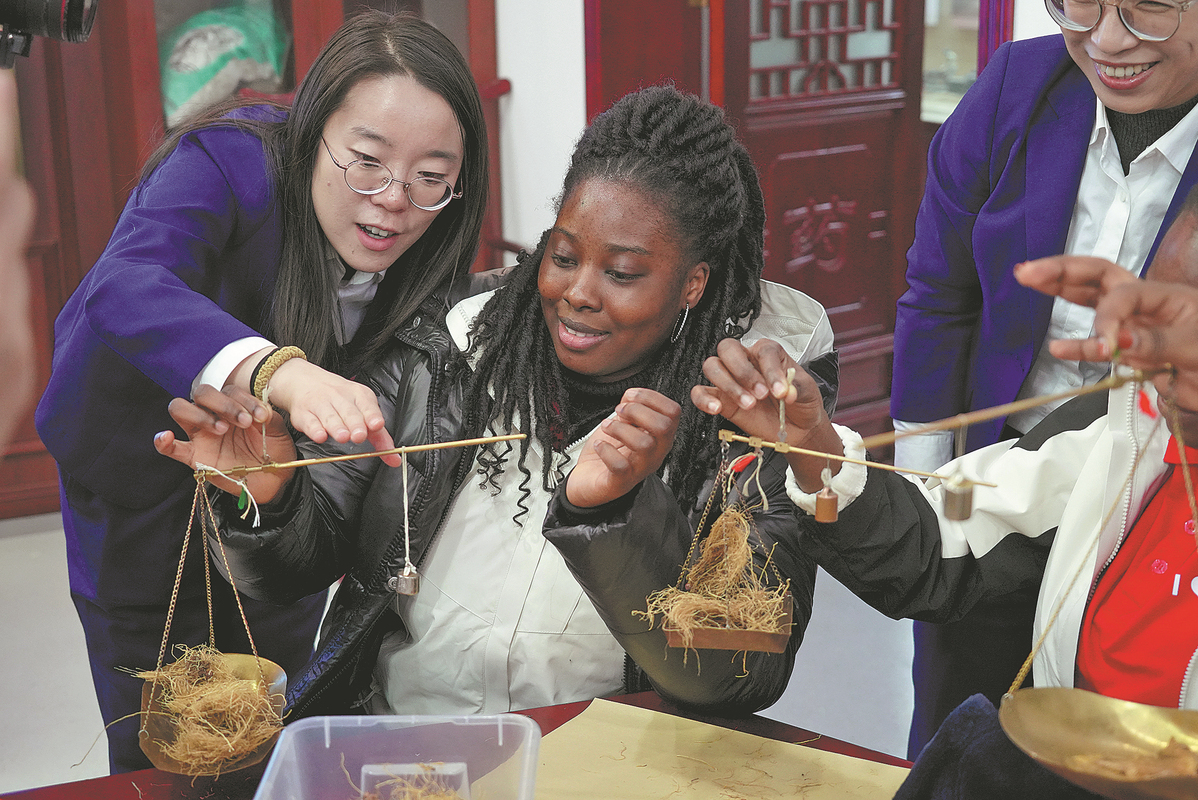
A guide helps an international student weigh Chinese herbs using a steelyard balance at the herbal dispensary of the Liaoning Vocational College of Medicine in Shenyang, Liaoning province. Provided to CHINA DAILY
A group of international students in Shenyang, Liaoning province, were given a guided tour of the Liaoning Vocational College of Medicine recently, learning about the history of traditional Chinese medicine and how it is being enhanced in the modern era with the help of technology.
Member of the group Olga Subi Malekani, a doctoral student from the Democratic Republic of the Congo, said she was impressed by how technology is being used to enhance the experience at the college's exhibition hall.
"This is amazing! Through virtual reality, I can see the growing process of ginseng, as well as distinguish the subtle differences between wild and cultivated ginseng," she said.
Malekani, who studies management science and engineering at Shenyang University of Technology, used VR to learn about the origin and medicinal benefits of common TCM ingredients such as liquorice, raspberry and ginkgo.
Fourteen foreign students took part in the tour, which was organized by the two educational institutions in late November, aiming to promote traditional Chinese culture and exchanges among international students.
At the herbal dispensary, Zhang Jianjun, deputy director of the college's department of pharmacy, demonstrated the use of a steelyard balance, a type of scale that dates back to ancient times. He adjusted the copper balance to level, then precisely placed special copper weights in sequence.
Ali Riaz, 31, a doctoral student in micro-manufacturing engineering, said: "The precision of these traditional tools is remarkable. Especially the progressive design of the weights, from the smallest fraction to the largest unit, perfectly suited for TCM preparation."
Amara Keita, 32, a master's student in electrical engineering from Guinea, tried grinding herbs with a mortar. "You need to keep the force steady to keep the fineness of the powder," Zhang instructed.
Keita said it reminded him of his grandmother preparing traditional medicine. "It's fascinating how traditional wisdom shares common ground across cultures," he said.
The process of making mugwort sticks particularly interested Grace Kouassi, 26, from Cote d'Ivoire. Mugwort sticks are used in moxibustion, a TCM therapy that involves burning mugwort on or near the skin at specific acupuncture points to stimulate circulation.
She carefully observed each step of the process: cleaning, straightening and rolling the mugwort.
"I never knew making mugwort sticks requires such attention to detail," she said, while concentrating on her work.
"The teacher explained that we need to follow the grain pattern and apply even pressure to achieve the right texture. There is so much wisdom in these seemingly simple steps," she added.
Raja Muhammad Adeel, 25, a mechanical engineering master's student from Pakistan, learned how to select ginseng slices for tea and controlling water temperature, saying that he never knew making tea could be such an exquisite art.
As the tea aroma filled the air, the students gathered to discuss traditional medicines from their own countries.
"What excites me most is how these seemingly ancient skills are actually quite 'young'," said Bilal Shabbir Chohan, 34, a doctoral student from Pakistan, adding that through the digital exhibition and hands-on practice, he received great insight into traditional medicine.
"Our traditional Unani medicine and TCM both stem from ancient civilizations. These innovative teaching methods could revitalize our traditional medicine too," he said.
Syed Musarat Hussain, 28, also from Pakistan, said the activity gave him a new perspective on traditional medicine and that "it's not just medical treatment, but a pursuit of perfection".
Bidding farewell to the students, Li Huayu, deputy dean of the International Education College of Shenyang University of Technology, said that culture knows no boundaries, and innovation gives tradition new vitality.
"These bright smiles are exactly what we hoped to see," Li said.
Liu Shicheng in Shenyang contributed to this story.
Contact the writers at chenmeiling@chinadaily.com.cn